June 5, 2018
A Half-Baked Wedding Cake

It’s hard to know sometimes if the cake is fully baked just by looking at it. Sometimes it needs to be skewered to see if it’s done or merely half baked. A baked cake is delicious. A half baked one? Not so much
The decision by the US Supreme Court (SCOTUS) in favour of baker Jack Phillips over his refusal in 2012 to bake a wedding cake for gay couple, Charlie Craig and Dave Mullins, is a half-baked cake.
And as such it risks leaving everyone with a sour taste in their mouths. The ruling doesn’t provide a strong conclusion either way, despite what both sides say. Indeed it simply leaves the door open for the elongated battle between competing rights to continue unabated.
In a majority 7-2 decision SCOTUS decided that the Colorado Civil Rights Commission had displayed inappropriate “hostility” towards Phillips in declaring that he had broken the state’s anti-discrimination laws.
Justice Anthony Kennedy, the same judge who cast the crucial vote that led to the recognition of same sex marriage in the USA, had this to say:
“The commission’s hostility was inconsistent with the First Amendment’s guarantee that our laws be applied in a manner that is neutral toward religion.”
You have to hand it to Justice Kennedy. He just doesn’t play ball with either side of the culture wars. Which, since impartiality is what it says on the “judge” label, is his job after all.
So that’s that then. Not so fast. Justice Kennedy went on to note:
“The court’s precedents make clear that the baker, in his capacity as the owner of a business serving the public, might have his right to the free exercise of religion limited by generally applicable laws, Still, the delicate question of when the free exercise of his religion must yield to an otherwise valid exercise of state power needed to be determined in an adjudication in which religious hostility on the part of the State itself would not be a factor in the balance the State sought to reach. That requirement, however, was not met here.”
Which simply means that if SCOTUS could come to the conclusion that a non-hostile judgement was reached in favour of the plaintiffs by generally applicable laws, the court could decide the other way. Say what you like about the US Constitution, it’s nothing if not malleable.
Or as Rod Dreher puts it in his response:
What if a gay couple went to Masterpiece Cakeshop tomorrow and asked for a wedding cake, and Jack Phillips turned them down, and they go to the Colorado Civil Rights Commission to complain? Could the Commission deliver the same verdict against Masterpiece, but do so in apparently neutral language, and therefore be on the right side of today’s ruling?
So it’s back to the bakery for Phillips, and back to the drawing board for gay activists. It surely tells us that the culture war is a battle about language and who gets to define meaning.
The result was, predictably, met warmly by religious groups, with Franklin Graham saying it was a clear answer to prayer and a win for religious freedom. And also, predictably, it was met with a hot response by LGBTQ groups, with one spokesperson, Sarah Ellis stating:
“While this decision does not change existing civil rights protections, it leaves the door wide open for religious exemptions to be used against LGBTQ people. Today’s decision emboldens the anti-LGBTQ Alliance Defending Freedom and the Trump administration in their persistent push to legalise discrimination against LGBT people under the misnomer of religious freedom.”
In other words, one side is happy this time. One side is not. And next time? Who knows which side will be happy and which side will warn of impending doom?
There’s no sense of rapprochement from either side on this debate, at least not from among those with the loudest activist voices, whether they be conservative and religious, or secular and gay.
The cake is only half baked. And no one can truly be happy with that.
It does show of course that there is no common ground in the increasingly hostile culture wars affecting the West. No sense of recognising the others deeply held beliefs. No sense of being able to take the initiative as a community and balance each other rights. No, it’s off to the school principal’s office to get our heads knocked together and told to play nice.
Leaving aside the different legal and political structures between the US and my own context in Australia, the future of freedoms and rights in the West is increasingly litigious and demarcated.
Plenty of time, money and energy is going to be spent in the coming decades due to the fact that our fractured – increasingly fracturing – culture is unable to live with its deepest differences in a manner that does not require state intervention.
And they are “deepest” differences. We’re not talking about mere lifestyle choices or business decisions. We’re talking about fundamental differences in how people view the world. There is no common ground from which to argue, and hence no common rights accepted by the community.
In the US, the Supreme Court seems like it is trying to hold the consensus cake together, but it will continue to crumble in their hands, and today’s ruling was more fudge than cake.
If you’re interested in a longer piece on this that tackles it from the perspective of a gay man who is pro-same sex marriage, but is looking for a via media with religious conscientious objectors, then read this excellent article.
If you’re keen to support me in my writing, you can do so at my support page.
Written by
There is no guarantee that Jesus will return in our desired timeframe. Yet we have no reason to be anxious, because even if the timeframe is not guaranteed, the outcome is! We don’t have to waste energy being anxious; we can put it to better use.
Stephen McAlpine – futureproof
Stay in the know
Receive content updates, new blog articles and upcoming events all to your inbox.


